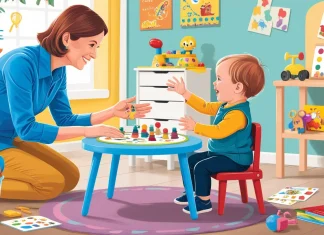Introduction
Welcome to the world of speech therapy, where the power of communication is unlocked and lives are transformed. In this article, we will delve into the intricacies of speech therapy, exploring its various aspects, techniques, and benefits. Whether you are a concerned parent, a curious individual, or someone seeking help for speech-related challenges, this comprehensive guide will equip you with all the necessary knowledge to understand and appreciate the significance of speech therapy.
What is Speech Therapy?
Speech therapy is a specialized form of therapy that aims to assess, diagnose, and treat speech and language disorders. It is a collaborative process that involves a speech-language pathologist (SLP) or speech therapist working closely with individuals of all ages, from young children to adults. The primary goal of speech therapy is to improve communication skills, enhance speech fluency, and address challenges related to language comprehension and expression.
The Importance of Speech Therapy

Effective communication is the cornerstone of human interaction. For individuals with speech disorders or language difficulties, expressing thoughts, emotions, and needs can be frustrating and isolating. Speech therapy plays a crucial role in breaking down these barriers, enabling individuals to communicate effectively, build meaningful relationships, and participate fully in society.
How Speech Therapy Works
The journey of speech therapy begins with a comprehensive evaluation conducted by a certified speech-language pathologist. The therapist assesses the individual’s speech and language abilities, identifies specific challenges, and designs a personalized treatment plan. The therapy sessions are structured, yet flexible, to cater to the unique needs and progress of each individual.
Different Types of Speech Disorders
Speech disorders come in various forms, each with its distinctive characteristics. Some common types include:
Articulation Disorders: Difficulty in producing speech sounds correctly, leading to unclear or distorted speech.
Fluency Disorders: Characterized by disruptions in speech flow, such as stuttering.
Voice Disorders: Affecting the pitch, volume, or quality of the voice, leading to hoarseness or raspiness.
Language Disorders: Challenges with understanding or using language, including receptive and expressive language disorders.
Common Speech Therapy Techniques
Speech therapists employ a wide range of techniques tailored to suit the needs of the individual. Some common techniques include:
Articulation Therapy: Focusing on correcting speech sound errors through repetition and practice.
Language Intervention: Enhancing language skills through exercises and activities.
Voice Therapy: Targeting vocal techniques and vocal hygiene to improve voice quality.
Fluency Shaping: Techniques to reduce stuttering and enhance speech fluency.
The Role of a Speech Therapist
A speech therapist plays a multifaceted role in the journey of communication improvement. They serve as educators, assessors, motivators, and mentors, providing guidance and support throughout the therapeutic process. Their expertise and empathy create a safe and encouraging environment for individuals to progress confidently.
Speech Therapy for Children
Early intervention is key in addressing speech and language issues in children. Speech therapy for children involves interactive and play-based approaches to make learning enjoyable and effective. Therapists work closely with parents and teachers to ensure consistent progress and growth.
Speech Therapy for Adults

Speech therapy is not limited to children alone. Adults experiencing speech or language challenges, be it due to neurological conditions, injuries, or other factors, can benefit from therapy as well. It can help improve articulation, comprehension, and social communication skills.
Benefits of Early Intervention
Early intervention in speech therapy yields remarkable results. When speech or language issues are addressed promptly in children, it can significantly improve their academic performance, social interactions, and overall self-esteem. Early intervention sets the foundation for a lifetime of effective communication.
Speech Therapy in Schools

School-based speech therapy programs are instrumental in supporting children with speech and language difficulties. Collaborating with teachers and other professionals, speech therapists ensure that students receive the necessary resources and assistance to thrive academically and socially.
Technology in Speech Therapy
The digital age has brought innovative tools and resources to enhance speech therapy. Speech therapy apps, online resources, and virtual therapy sessions have expanded access and made learning engaging and interactive.
Tips for Choosing a Speech Therapist
Selecting the right speech therapist is vital for the success of the therapy journey. Consider factors such as certification, experience, compatibility, and referrals to find a qualified and compassionate therapist who connects well with the individual.
Speech Therapy at Home

Reinforcing speech therapy techniques at home can accelerate progress. Engaging in activities that promote speech and language development can complement formal therapy sessions and encourage continuous improvement.
Conclusion
Speech therapy opens doors to effective communication and empowers individuals to express themselves confidently. The journey might have its challenges, but with the guidance of skilled speech therapists and the support of loved ones, the power of communication can be unlocked, transforming lives in profound ways.
FAQs
Is speech therapy only for children?
No, speech therapy is beneficial for individuals of all ages, including adults.
How long does speech therapy take to show results?
The progress varies for each individual, but early intervention often leads to faster improvements.
Are there any exercises to practice speech therapy at home?
Yes, there are various activities and exercises that can be done at home to complement formal therapy.
Can speech therapy help with stuttering?
Yes, speech therapists employ fluency-shaping techniques to reduce stuttering and enhance speech fluency.
What are some technology tools used in speech therapy?
Speech therapy apps and virtual therapy sessions are some of the technology tools used to support therapy.


























